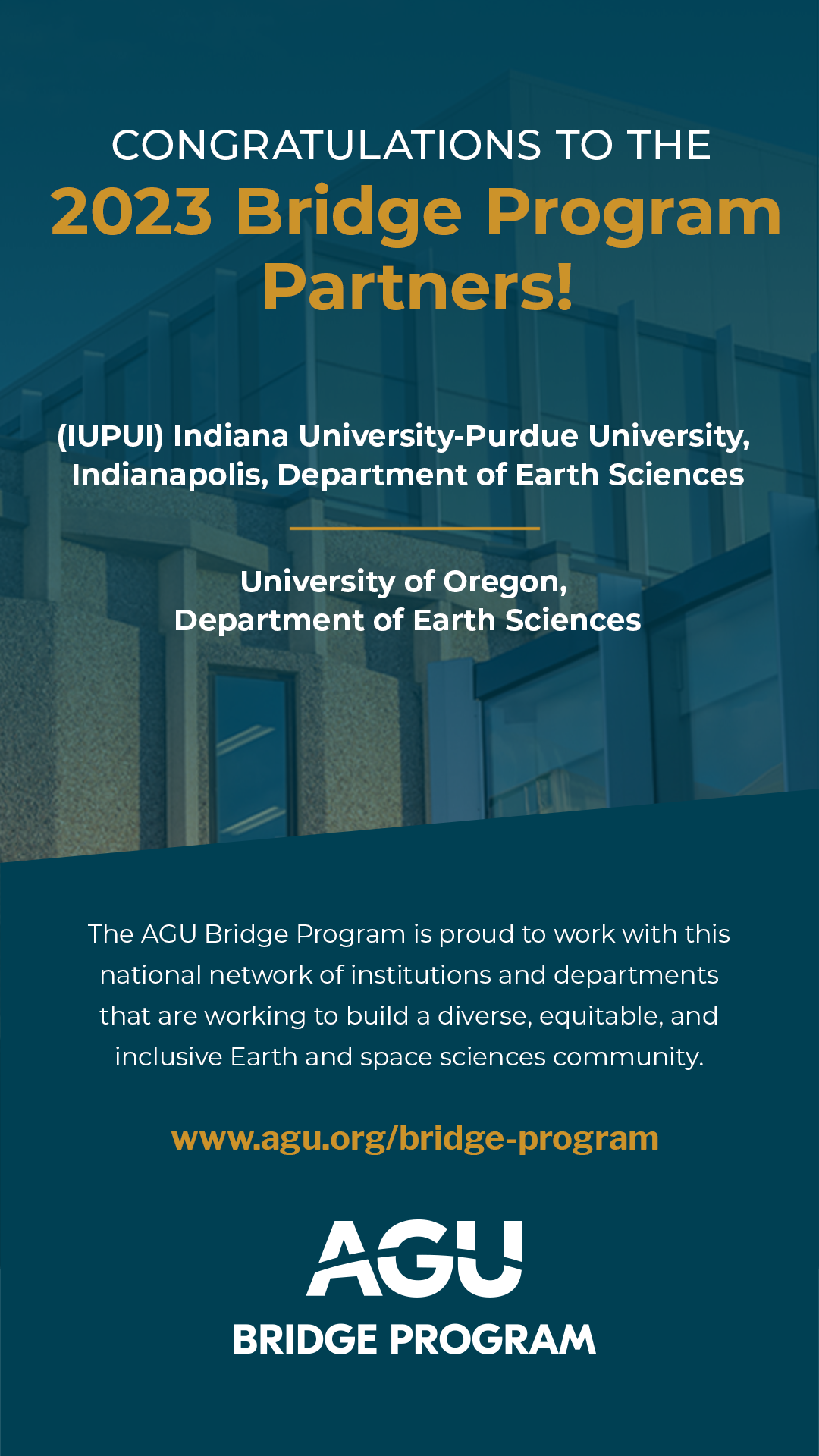
AGU Bridge Program
The AGU Bridge Program aims to advance equitable practices in graduate geoscience departments and to expand outreach and recruitment of students from historically marginalized populations in order to support the achievement of students' educational goals in supportive and inclusive environments.
AGU Bridge Program
In alignment with AGU's mission, strategic plan, and core values, the AGU Bridge Program aims to advance equitable practices in graduate geoscience departments and to support cohorts of students pursuing advanced degrees in the geosciences. The AGU Bridge Program is committed to promoting diversity, equity, and inclusion in the Earth and space sciences through the dissemination of leading practices in higher education and the facilitation of a graduate application pathway at our partner departments. Our goal is to expand outreach and recruitment of students identifying as Hispanic, Black/African American, American Indian, Pacific Islander, Alaskan Native or Native Hawaiian for the AGU Bridge Program to achieve their educational goals in supportive and inclusive environments, thereby raising graduate degree attainment rates for students holding these identities. Download our flyer and learn more.
As part of our commitment to ensuring an inclusive and equitable student experience, we expect our partner departments to:
- Participate in collaborative discussions with other partner departments and the AGU Bridge Program on practices that improve all programs
- Engage faculty/staff/students both internally and externally in discussions and actions that improve the access to and culture of graduate education for all students
- Work with AGU Bridge program to track student progress and submit progress reports (Grades, GPA, and transcripts are not collected)
- Submit annual impact reports
The program is open to those who have not applied to graduate school or applicants who applied to one or more geoscience graduate programs but did not accept an offer or commit to a specific department/program in the current academic year. See the student benefits and eligibility tab for additional eligibility requirements.
Requests for Bridge Partner Proposals will open this summer
Check back in June for the 2024 AGU Bridge Partner Request for Proposal
AGU Bridge Program Partner Institutions
The AGU Bridge Program is an asset to geoscience departments seeking to promote equity within their graduate programs and within the larger geoscience community. By working together, we can create a more welcoming environment in the Earth and space sciences for everyone.
Congratulations to the two departments selected for partnership in 2023: (IUPUI) Indiana University-Purdue University, Indianapolis, Department of Earth Sciences and University of Oregon, Department of Earth Sciences
The two partners selected in 2023 join the existing cohort of 50 partner departments selected from 2019-2022.
See our interactive map displaying all current AGU Bridge Program partners here! The map contains basic information about each partner department as well as links to each department website, and ways to filter through partner departments.

AGU Bridge Program Partner Benefits
Access to the AGU Bridge Program student applicant database.
Recognition by AGU of the department’s commitment to diversity and inclusion in the Earth and space sciences.
Recommendation of the department’s supportive post-baccalaureate educational environment to prospective and current Bridge Program students, applicants from historically marginalized backgrounds, and others.
Secure a five-year partnership with the potential to renew.
In addition to the benefits listed above, Bridge Program Partners will also receive access to AGU Bridge Program staff, veteran Bridge Program Partners, and other subject matter experts to provide resources and strategies for supporting historically marginalized students in graduate programs.
Application for Bridge Program Partner
AGU is focused on nurturing a positive culture that supports diversity as well as continued education in geosciences. When departments are accepted as an AGU Bridge Program Partner, they are committing to building and maintaining an inclusive and equitable community within their department and our larger geosciences community thereby increasing diversity within the Earth and space sciences. By working together, we will create a more welcoming environment in the Earth and space sciences for everyone.
We encourage graduate programs that have demonstrated a commitment to working with students from historically marginalized communities and supporting students from such communities as graduate scholars to join the Bridge Program as a Partner Department. The application is free. Applicants must be U.S. based institutions that grant a master’s or doctoral degree in geosciences.
AGU Bridge partner proposals are reviewed annually. The 2023 request for proposals is open now and closes on 20 September 2023 at 11:59pm ET. Please refer to the current request for proposal instructions ![]() . All 2023 applications must be submitted via our online submission platform. For additional instruction on how to submit your application, download the "Instructional Guide: AGU Bridge Partner RFP submission platform" document
. All 2023 applications must be submitted via our online submission platform. For additional instruction on how to submit your application, download the "Instructional Guide: AGU Bridge Partner RFP submission platform" document![]() .
.
Review the attached Bridge Program Dos and Don’ts ![]() for tips on how to submit a successful AGU Bridge partner proposal.
for tips on how to submit a successful AGU Bridge partner proposal.
Please reach out to Bridge Program staff at [email protected] with any questions.
How are Bridge partners selected?
Motivation
Departments are asked to provide their motivation for seeking to become an AGU Bridge partner and what their comittment to DEI advancement through the AGU Bridge Program will be.
Data & Demographics
We look at department retention rates and request that disaggregated demographic data is included.
Equitable Admission Practices
- We look for evidence of multi-faceted admission criteria and an admission process that examines a broad range of student potential to conduct original research without employing strict GRE cutoff measures.
- We expect departments to provide clear information about funding packages and additional financial resources for students.
Equity & Inclusion Efforts
In our review, we look for active departmental efforts to advance diversity, equity and inclusion. This looks different for each partner department.
Faculty Engagement
We seek engaged and committed faculty in our partner departments. Departments must describe how they will directly contribute to and mentors students who enter the department via the AGU Bridge Program.
Mentoring Activities
Mentoring is a vital part of graduate school, and we seek departments that are prepared to mentor students effectively, including students from historically marginalized communities. This can include training for mentors, previous success mentoring students from historically marginalized groups, and mentor-mentee compacts.
Advising & Induction Practices
We look for evidence that departments possess student handbooks, IDP’s and other induction and advising resources.
Progress Monitoring
A transparent and effective process for progress monitoring is an important component of student success in graduate programs. We look for evidence of how students are monitored and plans for early intervention, clear timelines for student milestones, and procedures for how grievances are handled. We also look at exam structures and exam pass rates.
Information for interested applicants
Interested in applying to graduate school in the geosciences? Apply through the AGU Bridge Program!
The AGU Bridge Program seeks to recruit and retain students from historically marginalized backgrounds into geoscience graduate programs around the country. Interested applicants can apply using a single, free application to be considered for graduate school admission by our 45+ partner geoscience departments. Our partners are committed to adopting best practices in admissions and retention of students and are striving to improve the geoscience education experience for all students. Students identifying as Hispanic, Black/African-American, American Indian, Pacific Islander, Alaska Native, or Native Hawaiian are encouraged to apply.
AGU Bridge Program partner departments review AGU Bridge applications each spring and may extend offers of admission to their graduate programs to interested applicants. Students who choose to enroll in graduate school via the AGU Bridge Program are automatically enrolled as program participants with AGU. Offers of admission are not guaranteed and interested applicants should review the various eligibility criteria of some of our partner programs to understand which advanced undergraduate coursework may be required. This may include courses in advanced calculus, math, or other related geoscience coursework. Students without an undergraduate degree in the geosciences should use the application to speak to how their studies have prepared them to successfully pursue a graduate degree in the geosciences.
Eligibility requirements
The Bridge Program application is open to applicants who did not apply to a geoscience graduate program, or, applicants who applied to one or more geoscience graduate programs, but did not accept an offer or commit to a specific department/program in the current academic year. If applicants are waiting to be notified about acceptance into a graduate school program, they should still apply for the AGU Bridge Program.
Successful applicants to the AGU Bridge Program must meet the following criteria:
Attain a bachelor’s or master’s degree in geoscience or a closely related discipline by the time they would enter the AGU Bridge Program.
Satisfy additional requirements of individual Bridge Program departments. Departments have different requirements and applicants may be asked to submit additional materials if admitted to programs that require them. Applicants are encouraged to ask departments about any additional requirements during the interview/contact period in the spring.
Students who identify with the following historically marginalized identities are encouraged to apply: Hispanic, Black/African American, American Indian, Pacific Islander, Alaskan Native or Native Hawaiian.
Be a U.S. citizen, permanent U.S. resident cardholder, or have current enrollment in the DACA program.

Frequently Asked Questions
Are students that have already attained a master's degree still eligible to apply to the AGU Bridge Program?
Yes, you are eligible to apply for the AGU Bridge Program even if you have already attained a master’s degree. The eligibility requirements state that applicants have obtained a bachelor’s or master’s degree in geoscience or a closely related discipline by the time they would enter the AGU Bridge Program. Note that students who have already attained a master’s degree in the geosciences must meet all other eligibility requirements, including not accepting an offer or committing to a specific department/program in the current academic year.
Do students receive stipends if accepted into a program and if so, in what amount?
The AGU Bridge Program does not presently offer funding to successful applicants nor to participating institutions, however, these institutions typically offer financial support, typically comparable or identical to stipends received by other graduate students at the institution. Once students receive graduate program offers, students should consider whether the offered financial support is sufficient for their needs.
Are women specifically included as a historically marginalized identity?
While women of all racial and ethnic groups have been historically marginalized in the geosciences and many other STEM fields, the specific focus of the AGU Bridge Program is to increase the number of graduate degrees awarded to individuals identifying as Hispanic, Black/African American, American Indian, Pacific Islander, Alaskan Native or Native Hawaiian, regardless of gender. Anyone is welcome to apply to the Bridge Program and students who identify with the above, listed identities are especially encouraged to apply to the Bridge Program.
What are some potential career paths I can pursue with a graduate degree in the geosciences?
A graduate degree in the geosciences opens the door to a number of potential career paths! While some students may continue a career in academia, most graduates will go on to careers outside of academia spanning a diverse array of fields including careers in industry, government, and non-profit organizations. For more information on geoscience careers outside academia, explore the resources from this link: https://www.grow-geocareers.com/
Bridge Application Timeline
Apply
Tips!
|
Mid-December: Applications Open
Gather:
- Transcripts
- Letters of recommendation
- Be prepared to list your education history, relevant coursework, and work and professional experience. We welcome your application with the understanding that many talented students may not have had access to research experience, if this is something you do have, you'll be able to list this on the application. You'll also be asked to write about your educational and career goals.
Mid-March: Applications Due
Applicants must submit their applications by the 15 March deadline.
Mid-April: Interviews
Departments begin contacting applicants to schedule interviews. Applications are reviewed by partner departments directly, not by AGU Bridge Program staff. While preparing for your interview, review this list of questions to consider asking.
Early/Mid-May: Receive Offer of admission directly from partner departments
Mid/Late-May: Choose Program!
Offers will include an acceptance deadline
Join
| Tips! Things to consider when reviewing offers:
|
July: Onboarding
- Accepted students are onboarded into the AGU Bridge program.
- Dates will vary for departmental orientations and onboarding, be sure to acquire this information from your department.
Learn more about mentoring, inclusive practices, advancing equity in the geosciences and how you can get involved.
General Resources
- AGU Ethics & Equity Center curates and shares resources, including workshops and trainings, for cultivating a diverse, equitable and inclusive scientific community in the Earth and space sciences.
- National Association of Geoscience Teachers DEI Resources from the NAGT Diversity, Equity, and Inclusion Committee, is a compiled list of organizations, guides, reading materials, and various media about DEI practices in higher education.
DEI in Geosciences Data, Statistics, and Reports
Diversity, Equity, & Inclusion (DEI) Data & Statistics
- Geoscience Numbers, Equity in Graduate Education (a collaboration between IGEN and the California Consortium for Inclusive Doctoral Education (CCIDE) project) gathered data regarding the representation of historically marginalized students in the Geosciences (Numbers, Data on general STEM)
- Diversity in Geosciences, from the American Geosciences Institute, shows demographic data in the geosciences from higher education to the workforce
- No progress on diversity in 40 years Bernard, R.E., Cooperdock, E.H.G, a published paper on demographics and diversity in geoscience doctorate programs over the last 40 years
Reports and Articles on DEI in STEM/Geoscience
- Race and racism in the geosciences a published article in Nature from Kuheli Dutt on racism, bias, and individual responsibility
- Moving Beyond the Business Case for Diversity EOS article by Rebecca Haacker, Melissa Burt and Marissa Vara on reframing equity for equity and individual sake instead business and productivity
- Diversity, Equity, and Inclusion in the Earth and Space Sciences. Special issue of AGU Advances including multiple published papers on trends, climate, call to actions, and best practices/guides
Where to Start
How Departments & Institutions Can Get Started
- FAQ of Doctoral Education from IGEN Research Hub, contains quick information on diversity in science, best admission practices, and impacts of the Bridge programs
- An actionable anti-racism plan for geoscience organizations by Ali, H.N., Sheffield, S.L., Bauer, J.E. et al. On systemic racism in the geosciences and how to combat it.
- To GRE or not to GRE: FAQ questions, answers, and cited sources on using the GRE in graduate school admissions. Also read GRE in Geosciences Nature articles - discusses current perspectives in the geosciences - and #GeoGRExit EOS article on why programs are dropping the GRE
- Highlighting altruism in geoscience careers aligns with diverse US student ideals better than emphasizing working outdoors published article from Carter, S.C., Griffith, E.M., Jorgensen, T.A. et al. on reframing to increase diverse recruitment and interest in the geosciences
- Fisk-Vanderbilt Master’s-to-PhD Bridge Program Toolkit compiled their lessons learned, strategies, and tools to inspire and provide concrete guidance for other practitioners in the field seeking to develop similar programs. To access these resources, you must fill out their form.
Mentoring Centers
- Mentoring365 is a safe virtual mentoring platform for those interested in the Earth and space sciences (ESS) community. You can become a mentor or mentee, no matter your expertise, interest or location, and connect with others to help with career search, skills, exploration, and navigation. (Mentors/Mentees)
- Center for the Improvement of Mentored Experiences in Research (CIMER) (IGEN partner) develops, implements and studies evidence-based and culturally aware trainings, facilitations and communities for research mentoring relationships. (Mentors)
- The Science of Effective Mentorship in STEMM Online Guide from National Academy Of Sciences with resources, tips, and tools on effective mentorship (Mentors)
Student & Faculty Relationships
- Equitable Practices For Writing, Reading, And Soliciting Letters Of Recommendation, a guide from Equity in Graduate Education University of Southern California (Mentors/Mentees)
- Writing Reference Letters for People With Disabilities, authored by Michelle Cooke, University of Massachusetts Amherst, AGU Bridge Partner department (Mentors/Mentees)
- Resources for Supporting Graduate Student Wellbeing, from IGEN Research Hub, a curated list of mental health and wellness resources (Mentees/Mentors)
Best Practices for Faculty
- Toilet stops in the field: An educational primer and recommended best practices for field-based teaching published article from University of Birmingham Earth Sciences Department professors, for more Field-based teaching tips check out Ten Steps to Protect BIPOC Scholars in the Field - Eos By J. Anadu, H. Ali and C. Jackson
- Ten simple rules for building an antiracist lab published article from Chaudhary VB, Berhe AA, who further discuss this in Building Antiracist Spaces in Your Department a free online webinar from AGU Heads and Chairs program and the American Geosciences Institute
Affinity Groups
Learn about some of the affinity groups in geosciences. Click on the links to get involved and learn more.
- 500 Queer Scientists
- 500 Women Scientists
- American Indian Science and Engineering Society (AISES)
- Asian Americans and Pacific Islanders in Geosciences (AAPIiG)
- Association for Women Geoscientists (AWG)
- Black In Geoscience (BiG)
- Black in Marine Sciences (BiMS)
- Black Women in Ecology, Evolution and Marine Sciences (BWEEMS)
- Earth Science Women's Network (ESWN)
- GeoLatinas
- Geoscience Alliance (GA)
- Minorities Striving and Pursuing Higher Degrees of Success in Earth System Science (MS PHD’S®)
- National Association for Black Geoscientists (NABG)
- National Organization of Gay and Lesbian Scientists and Technical Professionals (NOGLSTP)
- Society for Advancement of Chicanos/Hispanics & Native Americans in Science (SACNAS)
- Society Of Latinos/Hispanics in Earth and Space Science (SOLESS)
- Society of Exploration Geophysists (SEG) Women’s Network (SEGWN)
- Women of color and non-binary people of color in ecology, evolutionary biology, and allied fields (WOCinEEB)
The AGU Bridge Program is part of the Inclusive Graduate Education Network (IGEN), a partnership of over 30 societies, institutions, organizations, corporations, and national laboratories. Learn more about the network and other partner institutions through IGEN’s Partner page. This work is supported by the National Science Foundation under Grants Nos. 1834540, 1834545, 1834528 and 1834516.
Fellows

First Year PhD Student in California
| Bridge Fellow[The Bridge Program is ] a huge influence on my career, I ended up studying the topic I do because of meeting my advisor through the Bridge Program.
[I would recommend this program to other students in the future because ] It’s a great way to explore new opportunities and avenues!

First Year PhD Student in Northeastern United States
| Bridge Fellow[I would recommend it because ] This program will help improve diversity.

First Year PhD Student in California
| Bridge Fellow[The Bridge Program ] has played a defining role in my career... I have my dream job working as researcher.
I would absolutely recommend the bridge program to any one who is interested and motivated to pursue a PhD or masters. The program has shown they truly care about our success and make us part of a community that is committed to our success.
Partners

Dr. John Gierke, Michigan Technological University
| Bridge Partner
Dr. Steven Lower, Ohio State University
| Bridge PartnerThe AGU Bridge helped us do a better job recruiting (minoritized students) in the regular admission window.
The AGU Bridge Program is helping to boost diversity even when students don't come directly through the Bridge program.

Dr. Oliver Timm, University at Albany
| Bridge Partner
